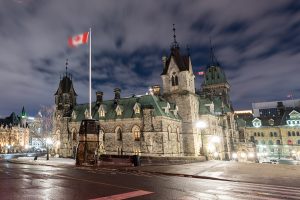Legislature Report: Geothermal Technology Touted as Clean Energy’s Next Chapter
George Lee,
Local Journalism Initiative Reporter
Community Newspaper Earns Shoutout for Life Lease Controversy Coverage
The St. Albert Gazette earned kudos in the legislature May 6 for its reporting on how seniors’ finances were affected by a fire that destroyed their homes.
Marie Renaud, the NDP member for St. Albert, stood to criticize the UCP and praise her hometown newspaper in the aftermath of the 2021 fire at a development for seniors in her community.
It was “thanks to excellent reporting” by The Gazette that details on how seniors were treated by a project developer came to light, said Renaud, the NDP critic for community and social services.
Tied to the story are life leases – sort of own-rent hybrids that have residents turn capital over to a developer in exchange for affordable housing. Life leases are often chosen by seniors as a practical way to reduce housing costs and alleviate some of the uncertainty and hassle that come with regular owning or renting.
At least that’s the way they’re promoted. But when significant numbers of lessees or their leaseholder decide to terminate an agreement, lessees can end up queuing for their cash.
Seniors who moved to sister developments received money back “after many months,” Renaud said. Others got balances after “a huge release fee” was deducted because they moved to other housing or long-term care.
Regulatory legislation introduced in March by the government and meetings with the developer are not enough, said Renaud. So far, new regulations are not retroactive.
Under the Consumer Protection Act, rules and penalties in Bill 12 would apply to developers. Entrance fees would have to repaid within 180 days of a lease ending
Despite multiple meetings with the developer, “after three years of zero progress by this minister we get toothless legislation,” said Renaud. “Three years later we have weak consumer protection for seniors and poor and lopsided consultation, as evidenced by the legislation.
But the UCP told the assembly that the NDP knew about the need for life lease regulations in 2017 while it was in power
Scott Cyr, the UCP member for Bonnyville-Cold Lake-St. Paul, said his government found 27 letters seeking life lease protection, addressed to a former NDP minister.
The NDP “could have prevented the life lease scandal that is rocking the development industry” but did nothing, Cyr said during a May 7 question period exchange.
Province Channels Newcomers to Rural Careers
Using immigration to plug labour gaps – it’s not just a big city thing, the legislative assembly heard May 6
“Our government is committed to the economic growth of our province by attracting skilled workers and entrepreneurs to every corner of this province, as Alberta remains the land of opportunity for us,” said Muhammad Yaseen, the minister of immigration and multiculturalism
Within and beyond major centres, the federal government is holding back Alberta in its immigration efforts because it did not increase nominations in 2024, Yasseen said. Last year, the province successfully secured a 50 per cent increase to 9,750 nomination.
Published reports have the actual total at more than 10,000 immigrants to Alberta in 2023, falling within an administrative buffer zone under the progra
Alberta will keep pushing for more nominations to meet economic growth, Yasseen said. “The lack of increase this year is unacceptable.”
A National Post story earlier this year quoted a statement from Immigration, Refugees and Citizenship Canada about how it decides on provincial nomination allocations. “Provinces regularly request allocation increases, and these requests are one factor that is considered in determining allocations,” said the statement.
Andrew Boitchenko, the UCP member for Drayton Valley-Devon, spoke of coming to Alberta from Ukraine to attend NAIT and find work, eventually settling in Parkland County about 20 years ago.
But the rural life is often not the first choice for immigrants, Boitchenko said, even though constituencies like his have job vacancies that need filling.
“How is the government of Alberta working to make newcomers aware of the opportunities in rural Alberta?” Boitchenko asked of his own party during question period.
Yasseen, the member for Calgary-North, singled out two new immigration streams for jobs beyond the bright city lights: rural renewal and rural entrepreneur. These join a pre-existing farm stream, Yasseen said.
“Rural communities are a critical part of Alberta and its economy,” he said.
Controversial Bills Entrenching Provincial Powers Continue to Prompt Sparring on Assembly Floor
The back-and-forth on two bills that critics classify as costly and unnecessary power grabs gained intensity in the Alberta legislature, last week.
The bills – one involving provincial oversight of federal funding arrangements, the other involving provincial regulation of municipal governance and elections – are “bad for business at every level,” said the NDP’s David Shepherd on May 9.
“When you have a premier, a government, bent on pursuing power, driven by ideology; when the only thing anyone else can trust is that they’ll always put their own ideological interests ahead of anything else: well, that’s about as unattractive for investment as it gets,” said Shepherd, the member for Edmonton-Centre.
Responded Matt Jones, the minister of jobs, economy and trade: “You know what’s was bad for investment? The NDP government from 2015 to 2019.”
The NDP were anti-energy and anti-business, resulting in “tens of billions of dollars of capital” leaving the province and the loss of 183,000 jobs, said Jones, the member for Calgary-South East.
That spar was just among literally dozens of exchanges and statements on the two bills during the legislature’s week that was.
Bill 18, the Provincial Priorities Act, 2024, would require entities under the province’s purview to get its approval for new or renewed agreements with the federal government. It would apply to amendments and extensions, too.
The UCP considers it a way to defend Alberta’s priorities and prevent the feds and other agencies from sidestepping the province.
But the NDP and representatives of municipalities and educational institutions call Bill 18 expensive red-tape. They say the bill would circumvent independence and drive funding out of the province – funding that would otherwise go towards housing, research and more.
The government expects that the legislature will pass Bill 18 before the summer break. Consultations are planned for the summer before regulations are finalized, and the legislation would then come into force in early 2025.
Bill 20, meanwhile, would “enhance integrity and maintain public trust” in local elections and councils, the government’s website says. Among its provisions are allowing political parties in municipal elections, after the idea is piloted in Edmonton and Calgary.
Other changes include eliminating automated voting equipment, allowing the provincial cabinet to remove councillors in the public interest, and enabling cabinet to amend or repeal bylaws.
Provisions are also included to speed up housing development, including a full exemption from property taxation for non-profit, subsidized affordable housing.
The government says it will “engage municipalities and other partners” in coming months and develop regulations.
Project Rules Drive Investment Away from Rural Alberta – NDP
The rural Alberta economy is taking an economic hit from the UCP government’s approach to renewable energy development, the NDP’s energy and climate critic said May 6.
Nagwan Al-Guneid, the member for Calgary-Glenmore, pinned TransAlta’s cancellation of one windfarm and the halting of three other power projects on “new, vague, arbitrary rules” that the NDP had earlier warned would undermine investor confidence.
Speaking during question period in the legislature, she also brought up recently revealed information that the government pressured the CEO of the Alberta Electric System Operator to support a moratorium on renewable energy projects.
Nathan Neudorf, the affordability and utilities minister, responded that most of the TransAlta projects are on hold, not dead. Their completion is pending a restructuring of the energy market that “TransAlta is a big factor in helping us develop, making sure we get it right.”
Continued the member from Lethbridge-East: “They are happy to work with our government. We want to see the right projects go ahead for the right balance for Albertans, to make sure we provide and continue to provide them the most affordable, reliable and sustainable electrical generation this province can get.”
Neudorf maintained that the development pause was an idea floated by the AESO – but by its chair. He added that other jurisdictions have paused renewables before, including Ottawa and California.
The seven-month moratorium ended in February, and the province announced rules then that keep renewable energy projects 35 kilometres away from areas deemed “pristine viewscapes.”
Neudorf said the pause, as the government called it, was necessary “to work on reliability, to work on connectivity, and to make sure that we prioritize agriculture lands across the province.”
TransAlta recently announced it would not go ahead with the Riplinger wind farm near Cardston, announced in 2020 as a 300-megawatt project slated for coming online in 2027.
On the company’s on-hold list are the 180-megawatt WaterCharger battery storage facility near Cochrane, the 99-megawatt Tempest wind project south of Lethbridge, and the 44-megawatt Pinnacle generator west of Edmonton, a thermal project.
‘Stay-the-Course’ Statement Identifies Important Riding Matters, MLA says
What matters to Albertans? If the people of one rural constituency have got it right, the answer list comprises affordability, over-taxation, safety, respect, freedom, health care, the economy, standing up for what’s right and taking care of those who need help.
That was the message from the UCP’s Shane Getson, relaying to the legislative assembly answers collected from Lac Ste. Anne-Parkland respondents since he ran for election in 2019.
Getson, the government whip, told the legislature May 8 he’s been asking the what-matters question in newspapers, town halls and social media posts.
It adds up to an endorsement of the UCP and its policies, Getson suggested. “Albertans are asking us to stay the course because it’s what matters to them.”
Recovery Centre, Better 2-1-1 to Improve Mental Health and Addiction Treatment – UCP
Better access to counselling and treatment will blanket the province in service to Albertans facing mental health and addiction challenges, the UCP predicted in the legislature May 8.
Using Mental Health Week as a launching point, the governing party touted a proposed Canadian Centre of Recovery Excellence as the path forward.
Dan Williams, minister of mental health and addiction, said he’s proud of the work the UCP government is doing to make sure that “every single Albertan gets the help they deserve.”
Williams, the member for Peace River, continued, “Everyone, no matter what you’re struggling with, deserves an opportunity at recovery.”
Bill 17 is paving the way for the creation of a Crown corporation for recovery excellence. CoRE, as the province dubs the centre, would conduct research and evaluate programs. It would use data and evidence to back up recommendations, and advance policies and global best practices, the Alberta government website says.
“It needs to be about the data, the evidence, so that we can have the absolute best for Albertans no matter who they are or where they come from,” said Williams, who is also the deputy government house leader.
Tany Yao, the UCP member for Fort McMurray-Wood Buffalo, said the government is taking steps to fund more than 10,000 additional addiction treatment spaces “right across the province.”
He pointed to a doubling of funding to the province’s 2-1-1 line. The line is a comprehensive, 24-hour chat and referral line for whatever issues callers and texters are dealing with.
CoRE kudos were included in Yao’s question period exchange with his fellow UCP member.
“Like any other ailment, addiction and mental health challenges can have a devastating impact on individuals, families, and societies. People require help, and I’m proud to see our government stepping up,” he said.
UCP Ministers Appeal to Ottawa for Renewables, Traditional Energy Support
Critics routinely charge that many of the Alberta government’s policies amount to fighting words with Ottawa over constitutional and government powers and turfs.
But much of verbal action on the legislative floor could be characterized by the words “a little help here, please,” when it comes to the UCP’s messaging about a Liberal government it regularly disparages.
To wit: traditional energy development and carbon capture, utilization and storage, or CCUS.
“Alberta is reducing emissions while growing the economy and powering the world,” Environment and Protected Areas Minister Rebecca Schulz said May 6. “We could be doing even more if the federal government would start helping and stop holding us back.”
Schulz, the member for Calgary-Shaw, estimated that a CCUS Genesee project recently canceled by Capital Power would have reduced carbon dioxide emissions by 3-million tonnes per year.
“But instead of helping, the federal government has rushed to layer on costly rules and regulations while slow-walking the incentives needed for emissions reduction projects in Alberta. They could support us in industry, but instead they delay and scare away the true investments that we need,” she said.
Angela Pitt, the UCP member for Airdrie-East, said the loss of the Capital Power project is disappointing. “The emissions reduction potential. . .was enormous, so it is a shame to see it not go forward because of Ottawa.”
Capital Power said the project was technically but not economically viable. Published reports said the federal government continues to be committed to CCUS as a contributor to a net-zero carbon Canada.
Meanwhile, Minister of Energy and Minerals Brian Jean said the Trans Mountain Pipeline expansion and Coastal GasLink are positives for Alberta and Canada’s ability to market energy around the globe.
But they are not enough, said Jean, the member for Fort McMurray-Lac La Biche.
“We need the federal government to come to the table with Alberta, sit down, and let’s talk about solutions on making sure that we have a regulatory process and a capital investment climate that the world comes to,” he told the legislature May 6.
“Alberta is ready.”
Scott Sinclair, the member for Lesser Slave Lake, pointed his UCP colleague towards Canada’s role in leveraging international energy partnerships to export oil and gas. He noted that Alberta ships more energy resources to the U.S. than Saudi Arabia, Mexico and Iraq combined.
Jean responded that more Alberta oil and gas delivered to more places is good for the world. “Canada has many trading partners that are thirsty for our energy products,” he said.
“The world is better with more Alberta energy.”
In October 2023, the Supreme Court of Canada struck down Ottawa’s Impact Assessment Act, dubbed by Alberta critics the “no pipelines act.” The court said parts of the law are unconstitutional.
The federal government intends to keep the law but amend it to address the court’s issues.
Also highlighted during the Jean-Sinclair exchange in the legislature were the development of hydrogen, carbon capture and modular nuclear reactors.
Geothermal Technology Touted as Clean Energy’s Next Chapter
Drilling expertise perfectly positions Alberta to add a new chapter – the one about geothermal development – to the province’s already storied energy history, a UCP member told the legislature.
Geothermal technology could reliably add emission-free, baseload electricity and heat to the utilities and energy industry, said Garth Rowswell, the UCP member for Vermilion-Lloydminster-Wainwright.
Canada’s first drilling accelerator is a possible outcome of a feasibility study the province is helping fund. “This facility will help kick our geothermal and clean tech sectors into overdrive,” said Rowswell.
The province recently announced $750,000 in funding to go towards a study led by April Calgary’s Eavor Technologies.
Geothermal technology draws on underground temperatures to heat homes and generate power.
Water can be circulated through sub-subsurface pipes to warm it up for above-ground uses, like home heating. A more industrial application gets naturally occurring hot fluids or steam to the surface to generate power.
Don’t Be Counted: More Honourable Than it Seems
Looked at one way, the UCP member for Olds-Didsbury-Three Hills is exactly that: an MLA representing the people of a rural riding south of Red Deer.
But in practice Nathan Cooper’s job is much more complicated.
Cooper is Speaker of the assembly. He recognizes others with points to make or questions to ask. Almost like a judge, he issues rulings, commands respect, resolves issues on the fly, and maintains conventions and precedent.
Questions, statements or exchanges in the chamber are done through the Speaker – not to a fellow member directly – to maintain some level of decorum.
And he rarely votes in the legislature. Rarely as in never, since becoming the Speaker in 2019, because he’ll vote only if there’s a tie.
The last time Alberta’s Speaker voted was May 3, 1973, Cooper told the assembly. The late Gerald Amerongen voted against a motion to adjourn a debate on the declining population of moose and elk in Alberta. Deadlock broken, the debate continued.
The first and only other time the Speaker has voted in the Alberta legislature was on April 14, 1923. The late Oran McPherson broke a tie by voting against an amendment that would require a special act of the legislature for the leasing of water power to develop hydroelectricity.
Said the modern-day Speaker on May 7: “If the trend (50 years between votes) had continued, I would have been put in a position last spring where I would have had to vote. Thankfully, I did not, but I want to offer all members of this place some comfort that I was prepared.
“My team had held spring training, or, as they referred to it, voting for dummies. I practised standing silently, and frankly it gave me a new appreciation for my colleagues to understand just how difficult it can be for some members.
“I look forward to not having to vote in any of the upcoming spring session, and I always encourage the assembly to decide for itself.”
George Lee,
Local Journalism Initiative Reporter
The Macleod Gazette





